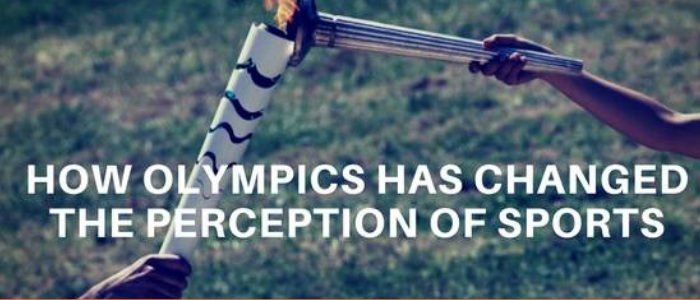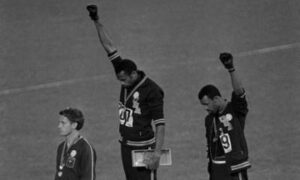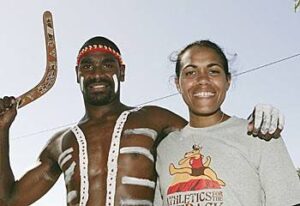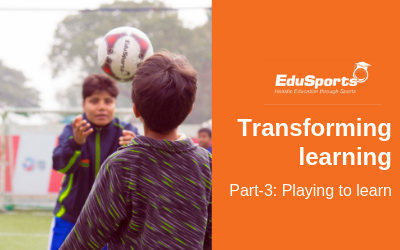“To succeed is to have failed” – learning from failures

How Olympics has changed the perception of sports
For centuries, people have come together to compete with each other and have vied for titles of the fastest man/ woman, greatest athlete, etc. This international event which started as a religious event and eventually established itself as the “coming together of the world” is known as the Olympic Games.
From ancient to modern: The journey of the Olympic Games
The beginning: The Olympic Games started in 776 B.C. in ancient Greece, dedicated to Zeus – the king of gods, with limited participation from freeborn male citizens of the country. There were no events for women, slaves and vandals of religious properties were prohibited from attending the competition. The winners were welcomed as champions, bringing honour and esteem to their town.
The end and the revival: After the Roman Empire conquered Greece in the 2nd century, Emperor Theodosius I seized power and banned all “pagan” festivals, thus closing the 12 centuries of Olympics’ chapters. But the archaeological discovery of the temple of Zeus followed by the Greece War of Independence (1821-1829) led to the revival of the Olympic Games.The first modern Olympic Games took place in 1896 in Athens with a participation of 13 nations and around 280 sportsmen.
Olympics as the bearer of hope
The 2012 Summer Olympics in London witnessed participation by more than 10,000 athletes from over 200 countries; 4 billion people watched the opening ceremony on television and another 20 million people visited the city generating approximately $14 billion for the country. The 2016 Rio Olympics promises bigger and better numbers!
For those of us who are waiting to witness the Rio Olympic cauldron being lit amidst myriads of spectators during the opening ceremony, it is also perfect timing to reflect on the current state of sports and the Olympics.
Vision, Mission and Values: From the very beginning, Olympics held a very important vision and mission to contribute to building a better world and educating youth through sports. The three Olympic values hold true even for the last sportsman standing – striving for excellence, demonstrating respect and celebrating friendship.
This showcase of peaceful rivalry between nations through sport competitions rewarded us with many touching moments of hope and peace. The historic photo of John Carlos and Tommie Smith, two medal winning men of colour, with their black-gloved fists in the air, was a strong symbolic gesture for African American civil rights in 1968, Mexico. When Cathy Freeman, an Australian Aborigine, won the 400m race in front of a jubilant home crowd in 2000, Sydney, many historians saw it as a symbol of reconciliation with Australia’s native people.


However, Olympics were also being hijacked for more dubious political ends. Munich, 1972 was the most tragic moment in Olympic history when eight Palestinian militants broke into the Olympic Village and killed eleven Israeli athletes.
Off late the news and controversies around illegal enhancement drugs are blotches which further tarnish sports’ image and discourage aspiring sportspersons. Such unsportsmanlike behavior of sportspersons should be checked.
Olympics and India: The On-Off relationship
The Indian medals tally: In Athens 2004 the Indian contingent brought home one silver which progressed to three medals in Beijing 2008 and to six medals in London 2012. Since 1928, India has won overall 24 medals, with hockey contributing 11 to that tally. In fact India is the only country in the world which has not matched its economic clout with sporting success.
The hurdle race: The stunted progress in sports is often attributed to lack of adequate funds, infrastructure and sponsorship; political intervention and unwillingness of sports authorities to provide adequate training sessions are additional hurdles to success.
But the fundamental problem lies in the non-sporting culture that we grow up in, where parents and teachers equally discourage their children’s interest in sports. We are a die-hard sporting nation but only to a selective sport – cricket. Athletics, fencing, equestrian competitions etc. do not even surface in conversations, leaving behind many potential sportspersons untapped.
The sporting culture: The gargantuan task to establish the sporting culture should start at the school level with schools including Sports and Physical Education as an integral part of the curriculum. Organizations, for e.g., EduSports, have been collaborating with schools to provide age – appropriate Sports and Physical Education curriculum, proved to be a boon for the children and schools. The holistic approach of such a curriculum with regular assessments by EduSports’ coaches is guiding students to develop interest in specific sports while cultivating sportsmanship qualities. Kudos to EduSports for pioneering and leading the sporting culture in India, working at the grass root level and inspiring many schools and organizations alike.
With things slowly turning positive in the fields of tennis, boxing, badminton, archery, Indian representatives are trying hard to find their ground. Sponsorships, media publicity, rewards and recognitions by governments to medal winning performances could act as morale boosters to these emerging champions. After all, despite many hurdles and hiccups, Abhinav Bindra, Sushil Kumar, SainaNehwal and a handful more have created history in Olympics. Indian contingent, with due support can certainly turn the medal chart around with some dazzling athletic achievements and a few feel-good stories to tell.
Let the Games begin
Professional sport is a spectacle and the Olympic Games provide the best stage to perform. From the torch relay and opulent opening ceremony to the spectacular closing ceremony, the audience is captivated by the display of art and culture of the host nation and incredible performances shown by the athletes. With few days remaining for the opening ceremony, let us gear up to support the athletes as they vie to clench the gold, silver and the bronze; let us support the spirit of sports and cheer for the winners and the participants with equal zest.
Bibliography:
Cartwright M. (2013) Olympic Games . Available from: https://www.ancient.eu/Olympic_Games/ [Accessed 28 July 2016]. History.com. Available from: https://www.history.com/topics/olympic-games [Accessed 28 July 2016]. Ghosh R. (2012) India’s 112 years at Olympics- A saga of hope and gloom. Available from: https://www.dnaindia.com/india/report-india-s-112-years-at-olympics-a-saga-of-hope-and-gloom-1727675 [Accessed 29 July 2016]. Kaur R. (2014) Why the performance of India is so poor in Olympics? Available from:https://www.mapsofindia.com/my-india/india/why-the-performance-of-india-is-so-poor-in-olympics [Accessed 28 July 2016]. Pettinger T. (2009) Costs and benefits of the Olympics. Available from: https://www.economicshelp.org/blog/29/sport/costs-and-benefits-of-the-olympics/ [Accessed 27 July 2016]. Realtruth.org. The Olympics- What the games have taught us. Available from:https://realtruth.org/articles/255-towtghtu.html [Accessed 29 July 2016]. Sibilski L. (2016) Is sport inhumane? Available from: https://blogs.worldbank.org/publicsphere/sport-inhumane [Accessed 27 July 2016]. Whipps H. (2012) How the Olympics changed the world. Available from: https://www.livescience.com/2733-olympics-changed-world.html [Accessed 28 July 2016].






